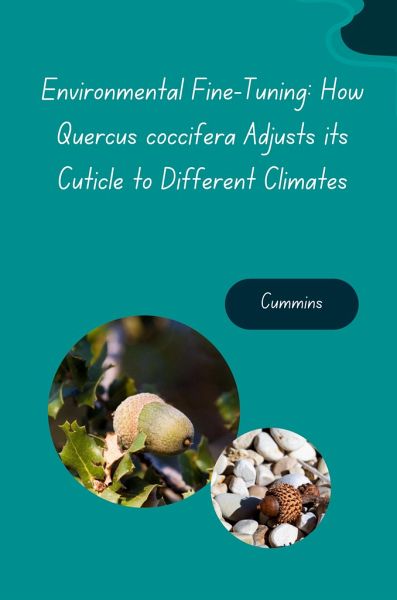
Environmental Fine-Tuning: How Quercus coccifera Adjusts its Cuticle to Different Climates
Versandkostenfrei!
Versandfertig in 6-10 Tagen
28,49 €
inkl. MwSt.

PAYBACK Punkte
0 °P sammeln!
The Mediterranean basin is characterized by a mosaic of climates, ranging from hot and dry summers with mild winters to areas with colder winters and more evenly distributed precipitation. Quercus coccifera, a keystone evergreen shrub or small tree, is a dominant species across this region. Its success can be attributed to several factors, including its sclerophyllous leaves with a well-developed cuticle.The cuticle is a vital structure composed of cutin (a biopolymer) and embedded waxes. It plays a crucial role in regulating water loss, gas exchange, and defense against pathogens. Understandi...
The Mediterranean basin is characterized by a mosaic of climates, ranging from hot and dry summers with mild winters to areas with colder winters and more evenly distributed precipitation. Quercus coccifera, a keystone evergreen shrub or small tree, is a dominant species across this region. Its success can be attributed to several factors, including its sclerophyllous leaves with a well-developed cuticle.The cuticle is a vital structure composed of cutin (a biopolymer) and embedded waxes. It plays a crucial role in regulating water loss, gas exchange, and defense against pathogens. Understanding how Quercus coccifera adjusts its cuticle to different climates provides valuable insights into plant adaptation strategies.Impact of Temperature on Cuticle Composition:Studies have shown that Quercus coccifera modifies its cuticle composition in response to temperature variations. In hotter and drier regions, the cuticle exhibits a higher concentration of cutin and specific waxes. Cutin is a strong hydrophobic (water-repellent) molecule, and increased cutin content reduces water permeability, thereby minimizing water loss through transpiration. Additionally, specific waxes, like long-chain alkanes, further enhance the hydrophobic properties of the cuticle, creating a more effective barrier against water loss.














